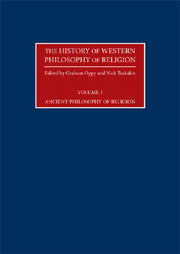Book contents
- Frontmatter
- Contents
- Editorial Introduction
- Contributors
- 1 Ancient Philosophy of Religion: An Introduction
- 2 Pythagoras
- 3 Xenophanes
- 4 Socrates and Plato
- 5 Aristotle
- 6 Epicurus
- 7 The Stoics
- 8 Cicero
- 9 Philo of Alexandria
- 10 The Apostle Paul
- 11 Plutarch of Chaeroneia
- 12 Sextus Empiricus
- 13 Early Christian Philosophers: Justin, Irenaeus, Clement of Alexandria, Tertullian
- 14 Origen
- 15 Plotinus
- 16 Porphyry and Iamblichus
- 17 The Cappadocians: Basil of Caesarea, Gregory of Nazianzus, Gregory of Nyssa
- 18 Augustine
- 19 Proclus
- 20 Pseudo-Dionysius
- Chronology
- Bibliography
- Index
17 - The Cappadocians: Basil of Caesarea, Gregory of Nazianzus, Gregory of Nyssa
- Frontmatter
- Contents
- Editorial Introduction
- Contributors
- 1 Ancient Philosophy of Religion: An Introduction
- 2 Pythagoras
- 3 Xenophanes
- 4 Socrates and Plato
- 5 Aristotle
- 6 Epicurus
- 7 The Stoics
- 8 Cicero
- 9 Philo of Alexandria
- 10 The Apostle Paul
- 11 Plutarch of Chaeroneia
- 12 Sextus Empiricus
- 13 Early Christian Philosophers: Justin, Irenaeus, Clement of Alexandria, Tertullian
- 14 Origen
- 15 Plotinus
- 16 Porphyry and Iamblichus
- 17 The Cappadocians: Basil of Caesarea, Gregory of Nazianzus, Gregory of Nyssa
- 18 Augustine
- 19 Proclus
- 20 Pseudo-Dionysius
- Chronology
- Bibliography
- Index
Summary
Prior to the advent of the Cappadocian Fathers – Basil of Caesarea (c.330–79), his friend Gregory of Nazianzus (329–89), and Basil's brother Gregory of Nyssa (c.335–c.395) – Cappadocia, to the north-east of modern Turkey, seems to have been something of a cultural backwater. Hence comes the epigram, ‘It is as hard to teach turtles to fly as to teach Cappadocians to write good Greek’. The three Fathers came from very respectable and prosperous families, and at any rate two of them received a good classical education in the university of Athens for about five years. An elaborate account of their life is provided by Gregory of Nazianzus' Oration 43, a panegyric of his friend and younger contemporary, Basil.
Unfortunately what we should most like to know, the nature of their philosophical background, is much more difficult to arrive at. The education at Athens was largely rhetorical and we know little or nothing about the sort of philosophy they would have encountered. A general acquaintance with some sort of Platonism must be assumed. But that apart, we are reduced to conjecture. The great period of revived Neoplatonism was to occur during the fifth century, with Proclus and Macrobius being worthy of note, the former because of the influence he exercised on Pseudo-Dionysius. Although the fifth century saw an increased interest in Platonism, this came too late to affect the Cappadocian approach.
- Type
- Chapter
- Information
- The History of Western Philosophy of Religion , pp. 235 - 246Publisher: Acumen PublishingPrint publication year: 2009



